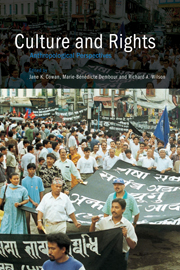Preface
Published online by Cambridge University Press: 05 June 2012
Summary
The political rhetoric of ‘culture’ confronts us each time we open a newspaper, or turn on the television or radio. For example, in autumn 1999 international media carried the story of a treaty successfully negotiated between the Canadian Parliament and the Nisga'a people, granting the latter land, access to natural resources and self-government. In that same period, a British Airways inflight magazine carried a colour spread on the Sorbs, ‘the forgotten people’, ‘one of the smallest races in Europe’ and survivors of ‘1300 years of oppression’. The Sorbs were reported to have brought a case before the European Commission of Human Rights concerning the actions of a mining company which threatened to displace them and irreversably alter their distinctive way of life. These are just two random illustrations of a rhetoric which is specific to our times and in which culture is presented as an object of rights.
In the hope of grappling with the motives and consequences of claims to culture in the language of rights, in July 1997 we organised the Sussex Workshop on Culture and Rights', in Brighton. The workshop brought together an international and interdisciplinary group of scholars (from anthropology, sociology, law, social and political theory, and feminist studies) with the aim of developing a rich and conceptually useful understanding of contemporary rights struggles. We are grateful to the participants of the workshop for their sharp but generous critical engagement and for their help in formulating meaningful questions (as much as answers) about this still underexamined conjunction.
- Type
- Chapter
- Information
- Culture and RightsAnthropological Perspectives, pp. xiii - xivPublisher: Cambridge University PressPrint publication year: 2001



